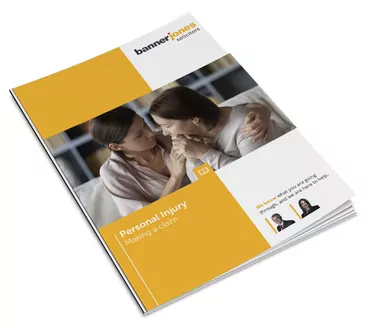Protecting Your Assets
Banner Jones are specialists at Assets Protection in Divorce Proceedings.

Protecting Your Assets in Chesterfield, Sheffield, Dronfield and Mansfield
We can help with your divorce, children or finances matter
The division of assets during a divorce can be difficult for everyone involved and you may be wondering if there are ways to protect your assets. Our Family Law team at Banner Jones are ranked among some of the best in the country as part of the UK Legal 500, so be assured that we can assist.
It is very common if you are the main breadwinner that you'll feel any solution will go against you, but don't worry there are ways we can help the make outcome work for you.
Expert advice on Protecting your Assets
At Banner Jones, we have over 150 years of matrimonial experience within our family law department. We have solicitors dealing with a range of complex cases including land owners, lottery winners, business leader and even professional footballers.
Our family solicitors in Sheffield, Mansfield and Chesterfield have a wide range of skills (as well as experience) and can offer flexible solutions to suit your needs. One of the best ways to protect your assets is to not to waste them on expensive, ill-informed Court battles.
Protecting your Assets process
We can help you avoid Court if this suits you, however, if preferred we can guide you through the more traditional Court process in order to protect your assets. Whichever method you decide to use we will be with you every step of the way.
Contact one of our expert solicitors for more Asset Protection advice
Our expert solicitors are highly experienced and will treat each case uniquely depending on your circumstances. Our family law team achieve solutions through confidential settlements and are always on hand to provide support as we know going through a complex divorce can be an extremely stressful time. We ensure each of our clients receive the upmost care and consideration throughout the process, and we will strive to do our best to protect your assets.
We have offices in Chesterfield, Sheffield, Dronfield, Mansfield and Nottingham.
Want to know more?
Common Protecting Your Assets Questions
How are we supposed to deal with assets like life insurance or endowment policies?
When agreeing a fair settlement life insurance and endowment policies are taken into account. You should agree how the policies will be handled and whether premiums will be paid for regular contribution policies, and whether the beneficiaries of any life insurance cover will need to be changed.
You may choose to sell your policies or retain individual ones. Any policies which you have in joint names will usually be transferred into an individual’s names. You should take advice when considering selling any policies as this may results in a sharp fall in the expected value of the policy; any sale or transfer of the policy may have tax consequences.
How does the way in which we share expenses impact our assets if we were to break up?
Ownership of assets is usually determined by who paid for the asset. You can include different rules within your cohabitation agreement. If either partner contributes to the costs of buying and maintaining the home you live in this is likely to give them a claim to a share in the home. In your cohabitation agreement it should be stated that if one of you has the intention that the property should be owned by one of you and that any financial contributions made by the other partner is over general living expenses.
If I have a pre-nuptial agreement will my assets be protected?
A financial settlement should be fair, this is based on the needs of both partners and the welfare of any children involved.
Where there are plenty of assets you should consider having a prenuptial agreement. You may be able to use a prenuptial agreement to provide some protection to your assets that you bring into the marriage.
We both own separate assets how should this be treated?
Unless you have agreed otherwise:
- If you owned something before you began living with your partner you still own it
- If you buy something with your own money it belongs to you
- If you inherit or are give something that belongs to you
- If you buy things together they are jointly owned
We have assets held in a trust, are these taken into account?
This depends on the circumstances. Divorcing parties are required by their lawyers to disclose any trusts which they benefit or may benefit in the future, the value of these assets are taken into consideration. There may be an area where trustees of the trust have discretion over who will benefit.
If a spouse in the divorce has placed assets into a trust these may be taken into account. It may be possible to claim against the trust if it can be shown that assets are still under the settlor’s control, or that the settler created the trust once the marriage had started to break down with the intention of sheltering the assets for a claim.
Trust law is extremely complex and we would advise you to take legal advice.
What if I find out that my spouse has assets which were not disclosed when we agreed our financial settlement?
You are able to go to court and get the financial settlement altered.
What is taken into consideration when dividing marital assets?
In the absence of a negotiated agreement between the parties on marital assets the Court will apply its own discretion. Below are some of the main things which may be taken into consideration.
- The length of the marriage/civil partnership has an impact on the Court's decision, the longer the marriage the more tendency towards equality.
- The relative contributions to wealth created during the marriage/civil partnership. This does not mean that 'stay at home' spouses will necessarily receive a smaller settlement. If they can demonstrate that they provided the environment and support which enables the 'go getter' to amass wealth, then there is every chance of them being awarded a significant proportion of the assets. If they can prove for example that their own career has been put on hold to look after children this would be part of the consideration.
- Wealth brought into the marriage/civil partnership by each party. Usually, the 'non-marital' assets are divided in the proportion in which each spouse introduced them. Family inheritance is very complex area when it comes to division as the particular context in which the inheritance was given is taken into consideration.
- Pension rights. It is important to remember that pension rights form part of the marital assets and these can be divided.
- Standard of living. Finances permitting, the standard of living for any children and the parties during the marriage/civil partnership should be preserved at the levels previously enjoyed.
- Be aware that the previous behaviour of the parties is not usually a consideration at this stage of the process.
- Properly negotiated Pre-Nuptial agreements (if in place), can increasingly influence outcomes.
What tax is paid on the sales or transfer of assets in a divorce?
Assets transferred between spouses are exempt from capital gains tax. This exemption continues to apply during the tax year in which spouses separate.
After this tax year any transfer will normally be treated as a sale and will be subject to CGT. However the transfer of the family home to the spouse who still lives in it will continue to be exempt from CGT in many circumstances. The transfer of a property as part of a divorce settlement is also exempt from stamp duty.
Any assets transferred between spouses are exempt from any potential inheritance tax liability. Any transfer made after the divorce as part of a financial settlement is also exempt from this tax.
You should take advice on the best way to minimise the tax consequences in the divorce process.
We take data privacy very seriously, and we want you to understand and feel confident about how we collect, store and handle your personal data. If you’d like to find out more you can read our Privacy Policy.










